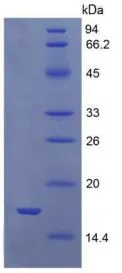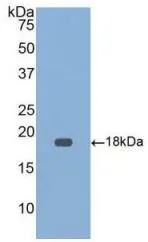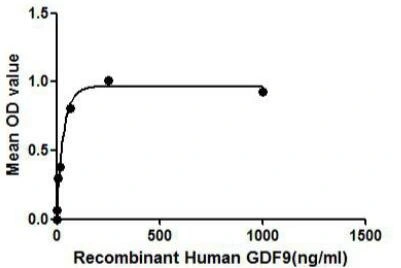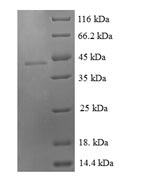
SDS-PAGE analysis of GTX00151-pro Human GDF9 protein.
Human GDF9 protein, His tag
GTX00151-PRO
ApplicationsFunctional Assay
Product group Proteins / Signaling Molecules
Protein IDO60383
Overview
- SupplierGeneTex
- Product NameHuman GDF9 protein, His tag
- Delivery Days Customer9
- Application Supplier NoteGDF9 (Growth/differentiation factor 9) is an oocyte derived growth factora which belongs to the transforming growth factor-beta (TGFbeta) superfamily. GDF9 is required for ovarian folliculogenesis and promotes primordial follicle development. S100A8 has been identified as an interactor of GDF9 through two-hybrid assay, thus a binding ELISA assay was conducted to detect the interaction of recombinant human GDF9 and recombinant human S100A8. Briefly, GDF9 were diluted serially in PBS, with 0.01% BSA (pH 7.4). Duplicate samples of 100 microl were then transferred to S100A8-coated microtiter wells and incubated for 2h at 37C. Wells were washed with PBST and incubated for 1h with anti-GDF9 pAb, then aspirated and washed 3 times. After incubation with HRP labelled secondary antibody, wells were aspirated and washed 3 times. With the addition of substrate solution, wells were incubated 15-25 minutes at 37C. Finally, add 50 microl stop solution to the wells and read at 450nm immediately. The binding activity of of GDF9 and S100A8 was in a dose dependent manner.
- ApplicationsFunctional Assay
- CertificationResearch Use Only
- ConjugateUnconjugated
- Gene ID2661
- Target nameGDF9
- Target descriptiongrowth differentiation factor 9
- Target synonymsPOF14, growth/differentiation factor 9
- Protein IDO60383
- Protein NameGrowth/differentiation factor 9
- Scientific DescriptionThis gene encodes a secreted ligand of the TGF-beta (transforming growth factor-beta) superfamily of proteins. Ligands of this family bind various TGF-beta receptors leading to recruitment and activation of SMAD family transcription factors that regulate gene expression. The encoded preproprotein is proteolytically processed to generate each subunit of the disulfide-linked homodimer. This protein regulates ovarian function. Reduced expression of this gene may be associated with polycystic ovary syndrome and mutations in this gene may be more common in mothers of dizygotic twins. [provided by RefSeq, Jul 2016]
- Storage Instruction-20°C or -80°C,2°C to 8°C
- UNSPSC41116120
- SpeciesHuman



